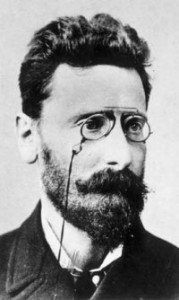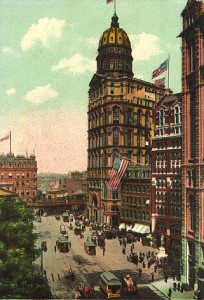April 10

Most folks recognize the name Pulitzer from the journalism awards announced every April. But the tradition didn’t begin until years after the death of newspaper magnate Joseph Pulitzer in 1911.
Pultizer was born in Budapest, Hungary, on this day (April 10) in 1847. As a young man he tried to join the army, but was rejected due to “a defect in one of his eyes”. (NY Times Obit) After failing to be admitted into the armies in France and England, Pulitzer crossed the Atlantic, and found better luck in the one country that wasn’t so fickle about physical requirements. The U.S. was in the midst of the Civil War and the Union Army needed fresh recruits, regardless of their ability to speak English or see their target.
Pulitzer served in the Lincoln Cavalry during the tail end of the war. After the war, he and a fellow Austrian pooled their money and caught a train as far West as their meager resources would take them. Landing in East St. Louis, Pultizer earned a living as a stevedore, a boat fireman, and even a grave digger during a great cholera epidemic.
The job that changed his life was traveling around the state of Missouri filing papers with each county clerk for the St. Louis & San Francisco Railroad. The job “gave him a knowledge which no other man then possessed of the land conditions of every county in the State, and real estate men found his services invaluable.” (NY Times Obit., Oct. 30, 1911) In his free time, Pulitzer studied law, and was admitted to the bar in 1868.
Quickly bored with law, Pulitzer found work as a reporter for the German newspaper the Westliche Post. Another reporter recalled Pulitzer as “exasperatingly inquisitive.”
“In one hand he held a pad of paper and in the other a pencil. He did not wait for inquiries, but announced that he was a reporter for The Westliche Post, and then he began to ask questions of everybody in sight.” (ibid)
Pulitzer was promoted to city editor of the paper, became active in local politics, and was elected to the state legislature.
In 1878, after returning from a reporting stint in New York, Pulitzer purchased the St. Louis Evening Dispatch at an auction for $2500. “When he entered the office the next morning as proprietor of his own newspaper he was unable to find as much as a bushel of coal or a roll or white paper. More complete ruin and decay were never seen in a newspaper office.” But “By impressing into service everybody within reach he managed to get out an issue of 1,000 copies.” (ibid)
Five years later Pulitzer had turned the paper around to such an extent that he was able to get a footing in New York journalism by purchasing the paper The World.
“He was unable to expend large sums of money in the gathering of the news, for the very excellent reason that he did not have it to spend. He did instill life and energy into every department of the paper on the very first day of his proprietorship…”
—The New York World
The World became particularly famous for its editorial pages, some of which had a sensationalist tinge.
“The World, under Mr. Pulitzer’s management, attained not only a huge circulation but the reputation of being the yellowest journal in the United States of America, a supremacy which even to-day is only challenged by Mr. Hearst’s American.”
– Little London Comment – Special Cable to the New York Times
In 1890, Pulitzer built the New York World Building, the tallest building in the country at the time, and a symbol of the paper’s success. And the time of Pulitzer’s death in 1911, the newspaper had been transformed into one of the most widely-read newspapers in the United States.

The awards for which Pulitzer is remembered today were established as part of his will in the years following his death. Pulitzer left money to Columbia University with the stipulation that a journalism school be founded. Columbia University began administering the Pulitzer Prizes in 1917, and continues to do so to this day. Though April 10 is not a holiday in any country, the Pulitzer Prizes, awarded for journalistic and literary excellence, are presented each year around the newspaper magnate’s birthday.
